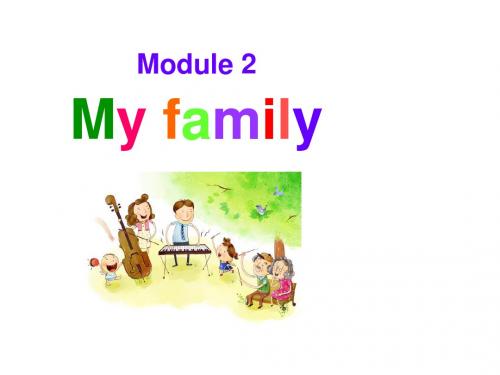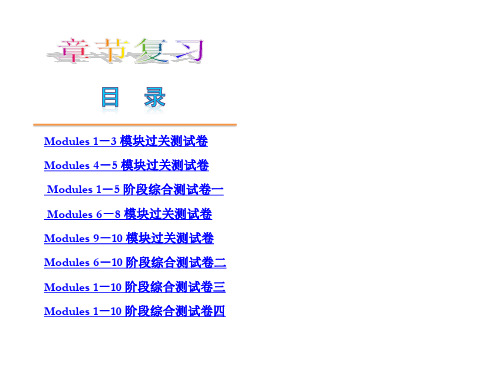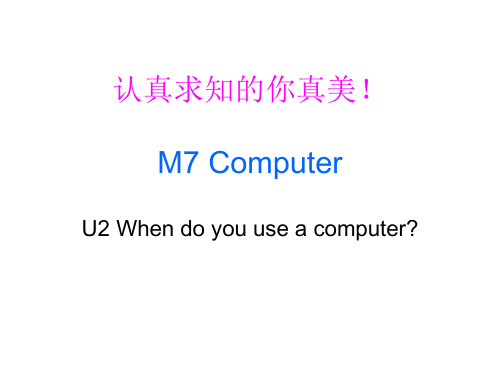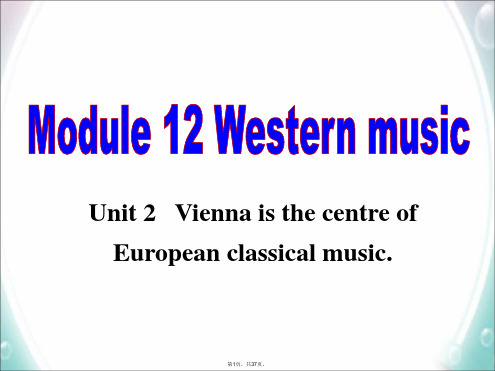2012版 外研社初一英语(最新版!!)
2012外研版新版英语七年级上册M2 U2(第二课时)

文章的末尾可以加上这样的句 子: I have a happy family. I love my family / parents.
这样,你的文章更有感情。
作业: 写一篇文章来介绍你的家人。 农民 farmer. a happy family love my family
Hello. My name is Tony Smith and I’m English. This is my mother. She is an English teacher at a school. This is my father. He is a hotel manager. This is my sister. She is a student. I have a happy family. I love my family.
Hello. My name is Mo Ping. These are my parents. We are Chinese. My father is a policeman. And my mother is a teacher. My family is a happy family. I love my parents. 幸福的 爱
假如你叫张君鹏,请根据以下提供的信 息写一篇书面表达来介绍你的父母亲。 Zhang Junpeng Chinese father: a bus driver mother: an English teacher a happy family love my parents.
Hello. My name is Zhang Junpeng. These are my parents. We are Chinese. My father is a bus driver. And my mother is an English teacher at a school. I have a happy family. I love my parents. 有 幸福的 爱
外研社2012版英语新标准七年级上册Starter Modules 1 ~ 4(洲泉中学2012学年第一学期课时作业(二))

洲泉中学2012学年初一年级第一学期课时作业(二)班级:_____________学号:_______姓名:_______________得分:____________ 一、单项选择。
(每小题1分,共15分。
)( ) 1. 你早晨见到史密斯太太向她问好,应说:________A. Mrs Smith, good morning.B. Good morning, Mrs SmithC. Smith Mrs, good morningD. Good morning, Smith Mrs( ) 2. “Good afternoon, class.”“________, Miss Li.”A. Good morningB. How are youC. HelloD. Good afternoon( ) 3. 在街上遇到好友Lily,你应该说:________A. Nice to meet you, too.B. Hi, Lily.C. Goodbye, Lily.D. What's your name? ( ) 4. “________”“Y es, P-E-N, pen.”A. What's this?B. Is this your pen?C. Can you spell it, please?D. What's your name, please?( ) 5. “________”“Fine, thank you.”A. How are youB. What's thisC. How do you doD. Hello( ) 6. “________ her name?”“Her name is Linda.”A. WhatB. What'sC. What amD. What are( ) 7. Ten and five is ________.A. fiveB. fifteenC. fourD. fourteen( ) 8. “Look! What's this ________ English?”“It's a clock.”A. forB. inC. onD. at( ) 9. “你怎样拼写book?”译文为“________”。
2012年新版外研版七年级英语上册Module2_My_family课件-Unit2_-_36281

Words and expressions manager nurse policeman job same n. 经理 n. 护士 n. 男(女)警察 n. 工作 adj. 相同的, 同一的
we pron. 我们
at prep. 在……里
Match the words in Box A with the words in Box B.
Words: hospital, hotel, policeman, school, theatre, doctor, manager, actor Phrases: bus driver, bus station, police station, hotel manager Patterns: My name’s … I’m Chinese. She/He is a doctor. She’s at a hospital.
二、根据句意及首字母完成单词。 1. I’ve got a s____ mall family. 2. Thank you for your e____. mail 3. Tony is in China w__ ith his mum and dad. 4. Lingling has got an American f_____. riend 5. Tony hasn’t got any grandparents with h__ im in China.
actor
nurses
bus driver manager
teacher
policeman
at a police station at a school at the same hospital in Beijing the manager of a theatre a hotel manager an English teacher an actor We are American.
外研社版(2012)初中英语七年级(上册)单词默写表(含音标、共682个)

7SSM2draw/drɔː/v.绘画,画7SSM2put/pʊt/v.放;置7SSM2up/ʌp/adv.向上地;prep.朝上;向上7SSM2hand/hænd/n.手7SSM2stand/stænd/v.站立7SSM2stand up/stænd ʌp/起立7SSM2close/kləʊs/v.合上;关闭7SSM2new/njuː/adj.新的7SSM2student/ˈstjuːdənt/n.学生7SSM2here/hɪə/adv.这里,在这里7SSM2in/ɪn/prep.在...里面7SSM2one/wʌn/num. 一7SSM2two/tuː/num. 二7SSM2three/θriː/num. 三7SSM2four/fɔː/num. 四7SSM2five/faɪv/num. 五7SSM2six/sɪks/num. 六7SSM2seven/ˈsɛvn/num. 七7SSM2eight/eɪt/num. 八7SSM2nine/naɪn/num. 九7SSM2ten/tɛn/num. 十7SSM2telephone/ˈtɛlɪfəʊn/n.电话7SSM2number/ˈnʌmbə/n.号码7SSM2old/əʊld/adj....年龄的,...岁的7SSM2how old/haʊ əʊld/多大,几岁7SSM2twelve/twɛlv/num. 十二7SSM2eleven/ɪˈlɛvn/num. 十一7SSM4Monday/ˈmʌndeɪ/n.星期一7SSM4Tuesday/ˈʧuːzdeɪ/n.星期二7SSM4Wednesday/ˈwɛnzdeɪ/n.星期三7SSM4Thursday/ˈθɜːzdeɪ/n.星期四7SSM4Friday/ˈfraɪdeɪ/n.星期五7SSM4Saturday/ˈsætədeɪ/n.星期六7SSM4Sunday/ˈsʌndeɪ/n.星期天7SSM4birthday/ˈbɜːθdeɪ/n.生日7SSM4favourite(Am E favorite)/ˈfeɪvərɪt /adj.最喜爱的7SSM4spring/sprɪŋ/n.春天7SSM4summer/ˈsʌmə/n.夏天7SSM4autumn/ˈɔːtəm/n.秋天7SSM4winter/ˈwɪntə/n.冬天7SSM4warm/wɔːm/adj.暖和的,温暖的7SSM4hot/hɒt/adj.热的7SSM4cool/kuːl/adj.凉快的7SSM4cold/kəʊld/adj.冷的7SSM4weather/ˈwɛðə/n.天气7SSM4like/laɪk/prep.如同,像7SSM4London/ˈlʌndən/伦敦7SSM4basketball/ˈbɑːskɪtˌbɔːl/n.篮球7SSM4football/ˈfʊtbɔːl/n.足球7SSM4swimming/ˈswɪmɪŋ/n.游泳7SSM4table tennis/ˈteɪbᵊl ˈtɛnɪs/乒乓球7SSM4sport/spɔːt/n.运动7SSM4let/lɛt/v.让,使7SSM4us/ʌs/pron.(宾格)我们7SM2right/raɪt/n.右边,右侧;adj.右边的,右侧的7SM2on the right/ɒn ðə raɪt/在右边,在右侧7SM2who/huː/pron.谁7SM2woman (pl. women)/ˈwʊmən (pl. ˈwɪmɪn)/n.成年女子;妇女7SM2next/nɛkst/adj.紧挨着,紧靠着;adv.紧接下来地,下一步7SM2next to/nɛkst tuː/在...旁边,紧挨着7SM2husband/ˈhʌzbənd/n.丈夫7SM2front/frʌnt/n.前面;正面7SM2in front of/ɪn frʌnt ɒv/在...的前面7SM2those/ðəʊz/pron.那些7SM2bus/bʌs/n.公共汽车7SM2station/ˈsteɪʃᵊn/n.站;车站7SM2hospital/ˈhɒspɪtl/n.医院7SM2hotel/həʊˈtɛl/n.饭店;宾馆7SM2police/pəˈliːs/n.警察7SM2theatre (Am E theater)/ˈθɪətə/n.剧院7SM2actor/ˈæktə/n.(男)演员7SM2driver/ˈdraɪvə/n.司机,驾驶员7SM2manager/ˈmænɪʤə/n.经理7SM2nurse/nɜːs/n.护士7SM2policeman(pl. policemen)/pəˈli:smən(pl. pəˈli:smən)/n.男警察7SM2we/wiː/pron.我们7SM2an/æn/art. 一(个,件...)7SM2job/ʤɒb/n.工作7SM2at/æt/prep.在... ;在...里7SM2same/seɪm/adj.相同的,同一的7SM2doctor/ˈdɒktə/n.医生7SM4carrot/ˈkærət/n.胡萝卜7SM4chicken/ˈʧɪkɪn/n.鸡肉7SM4chocolate/ˈʧɒkəlɪt/n.巧克力7SM4coffee/ˈkɒfi/n.咖啡7SM4cola/ˈkəʊlə/n.可乐7SM4juice/ʤuːs/n.果汁7SM4milk/mɪlk/n.牛奶7SM4potato/pəˈteɪtəʊ/n.马铃薯,土豆7SM4tea/tiː/n.茶7SM4tomato/təˈmɑːtəʊ/n.西红柿,番茄7SM4water/ˈwɔːtə/n.水7SM4shop/ʃɒp/v.逛商店;购物7SM4go shopping/ɡəʊ ˈʃɒpɪŋ/去买东西,去购物7SM4have/hæv/v.aux.(助动词);v.有;吃,喝7SM4get/ɡɛt/v.得到7SM4have got/hæv ɡɒt/有;拥有7SM4some/sʌm/adj.若干,一些;少量的;pron.一些,某些7SM4much/mʌʧ/adj.许多的,大量的7SM4too much/tuː mʌʧ/太多7SM4kind/kaɪnd/n.种类7SM4lots of/lɒts ɒv/大量;许多7SM4so/səʊ/conj.因此;所以7SM4How about...?/haʊ əˈbaʊt...?/(征求意见)...好吗?...行吗?7SM4has/hæz/(have 的第三人称单数现在式)7SM4bad/bæd/adj.坏的;不好的7SM4healthy/ˈhɛlθi/adj.健康的7SM4delicious/dɪˈlɪʃəs/adj.美味的7SM4bread/brɛd/n.面包7SM4fish/fɪʃ/n.鱼肉;鱼7SM4hamburger/ˈhæmbɜːɡə/n.汉堡包7SM4ice cream/aɪs kriːm/n.冰激凌7SM4noodle/ˈnuːdl/n.面条7SM4rice/raɪs/n.米;米饭7SM4sugar/ˈʃʊɡə/n.糖7SM4eat/iːt/v.吃7SM4child/ʧaɪld/(pl. children) n.(14 岁以下的)小孩,儿童7SM4be good for/biː ɡʊd fɔː/对...有帮助的7SM4sweet/swiːt/adj.甜的7SM4be bad for/biː bæd fɔː/对...有害的7SM4right/raɪt/adj.正确的,对的7SM4egg/ɛɡ/n.蛋;鸡蛋7SM4eye/aɪ /n.眼睛7SM4cheese/ʧiːz/n.奶酪7SM4tooth(pl. teeth)/tu:θ(pl. ti:θ)/n.牙齿7SM4bit/bɪt/n.一点儿;少许7SM4 a bit/ə bɪt/稍微;有点儿7SM4tired/ˈtaɪəd/adj.劳累的7SM4soup/suːp/n.汤7SM4important/ɪmˈpɔːtənt/adj.重要的7SM4remember/rɪˈmɛmbə/v.记住;想起7SM4well/wɛl/adv.好地7SM4stay/steɪ/v.保持;停留7SM4fat/fæt/adj.肥胖的7SM4get fat/ɡɛt fæt/发胖7SM5begin/bɪˈɡɪn/v.开始7SM5when/wɛn/adv.什么时候,何时7SM5go to school/ɡəʊ tuː skuːl/上学7SM5weekday/ˈwiːkdeɪ/n.工作日7SM5get up/ɡɛt ʌp/起床7SM5have breakfast/hæv ˈbrɛkfəst/吃早餐7SM5house/haʊs/n.房子;住宅7SM5start/stɑːt/v.开始7SM5work/wɜːk/n.学习;工作;v.学习;工作7SM5break/breɪk/n.(课间)休息7SM5have lunch/hæv lʌnʧ/吃午餐7SM5go home/ɡəʊ həʊm/回家7SM5evening/ˈiːvnɪŋ/n.晚上7SM5watch/wɒʧ/v.看,观看7SM5have dinner/hæv ˈdɪnə/吃饭;吃晚餐7SM5do/duː/v.做;干7SM5homework/ˈhəʊmˌwɜːk/n.家庭作业7SM5bed/bɛd/n.床7SM5go to bed/ɡəʊ tuː bɛd/上床睡觉7SM5sleep/sliːp/n.睡觉;v.睡觉7SM5go to sleep/ɡəʊ tuː sliːp/开始睡觉;入睡7SM5park/pɑːk/n.公园7SM5busy/ˈbɪzi/adj.忙的;繁忙的7SM5wash/wɒʃ/v.洗;洗涤7SM5face/feɪs/n.脸7SM5minute/ˈmɪnɪt/n.分钟7SM5grandma/ˈɡrænmɑː/n.(外)祖母7SM6country/ˈkʌntri/n.国家7SM6other/ˈʌðə/adj.其他的7SM6dangerous/ˈdeɪnʤrəs/adj.危险的7SM6ugh/ʊh/int.啊,哎呀7SM6also/ˈɔːlsəʊ/adv.也;而且7SM6plant/plɑːnt/n.植物7SM6look/lʊk/v.看,瞧7SM6look at/lʊk æt/看7SM6tall/tɔːl/adj.高的7SM6sure/ʃʊə/adv.的确,当然7SM6bamboo/bæmˈbuː/n.竹子7SM6cute/kjuːt/adj.可爱的7SM6shall/ʃæl/v.aux. ...好吗?要不要...?7SM6them/ðɛm/pron.(宾格)他们,她们,它们7SM6which/wɪʧ/pron.哪一个7SM6over/ˈəʊvə/prep.在...的上方7SM6there/ðeə/adv.在那里,往那里7SM6over there/ˈəʊvə ðeə/在那边,在那里7SM6funny/ˈfʌni/adj.有趣的7SM6call/kɔːl/v.把...叫做;称呼...为7SM6Africa/ˈæfrɪkə/非洲7SM6Asia/ˈeɪʒə/亚洲7SM6Europe/ˈjʊərəp/欧洲7SM6little/ˈlɪtl/adj.极少量的7SM6 a little/ə ˈlɪtl/少量7SM6only/ˈəʊnli/adv.仅仅;只7SM6about/əˈbaʊt/adv.大约,大致7SM7finally/ˈfaɪnəli/adv.最后7SM7print/prɪnt/v.打印7SM7paper/ˈpeɪpə/n.纸7SM7share/ʃeə/v.共用;分享7SM7Australia/ɒˈstreɪliːə/澳大利亚7SM7company/ˈkʌmpəni/n.公司;剧团7SM7often/ˈɒfᵊn/adv.经常7SM7customer/ˈkʌstəmə/n.顾客7SM7Internet/ˈɪntəˌnɛt/n.因特网7SM7check/ʧɛk/v.检查;查看7SM7train/treɪn/n.火车7SM7travel/ˈtrævl/n.旅行7SM7plan/plæn/n.计划;v.计划;打算7SM7ticket/ˈtɪkɪt/n.票7SM7music/ˈmjuːzɪk/n.音乐7SM7movie/ˈmuːvi/n.电影7SM7night/naɪt/n.夜晚7SM7search/sɜːʧ/v.搜寻;搜索;查找7SM7search for/sɜːʧ fɔː/搜寻;查找7SM7information/ˌɪnfəˈmeɪʃᵊn/n.信息7SM7email/ˈiːmeɪl/n.电子邮件7SM7send/sɛnd/v.发送7SM7game/ɡeɪm/n.游戏7SM7sometimes/ˈsʌmtaɪmz/adv.有时候;不时7SM7cinema/ˈsɪnəmə/n.电影院7SM7clothes/kləʊðz/n.衣服(总称)7SM7visit/ˈvɪzɪt/v.探望;参观7SM10meal/miːl/n.一餐;一顿饭7SM10speak/spiːk/v.说话,讲话7SM10happen/ˈhæpən/v.发生7SM10ready/ˈrɛdi/adj.有准备的;准备好的7SM10get ready for/ɡɛt ˈrɛdi fɔː/为...做好准备7SM10festival/ˈfɛstəvəl/n.节日7SM10quite/kwaɪt/adv.十分;相当7SM10at the moment/æt ðə ˈməʊmənt/此刻,目前7SM10beautiful/ˈbjuːtəfʊl/adj.漂亮的,美丽的7SM10at work/æt wɜːk/在工作7SM10away/əˈweɪ/adv.在安全的地方;在通常存放的地方7SM10put away/pʊt əˈweɪ/收起;收拾好7SM10hard/hɑːd/adv.努力地;adj.艰难的;困难的7SM10join/ʤɔɪn/v.参加;加入7SM10hurry/ˈhʌri/v.赶快;匆忙7SM10hurry up/ˈhʌri ʌp/赶快7SM10Christmas/ˈkrɪsməs/n.圣诞节7SM10February/ˈfɛbrʊəri/n.二月7SM10January/ˈʤænjʊəri / n.一月7SM10before/bɪˈfɔː/prep.在...之前7SM10sweep away/swiːp əˈweɪ/扫去7SM10luck/lʌk/n.运气7SM10table/ˈteɪbᵊl/n.桌子7SM10celebrate/ˈsɛlɪbreɪt/v.庆祝7SM10traditional/trəˈdɪʃənl/adj.传统的7SM10dumpling/ˈdʌmplɪŋ/n.饺子;团子7SM10programme (Am Eprogram)/ˈprəʊɡræm (æm iːˈprəʊɡræm)/n.(电视)节目7SM10sweater/ˈswɛtə/n.厚运动衫;毛线衣7SM10coat/kəʊt/n.外套7SM10mean/miːn/v.意思是;意味着7SM10lucky/ˈlʌki/adj.幸运的7SM10merry/ˈmɛri/adj.愉快的,高兴的7SM10Merry Christmas/ˈmɛri ˈkrɪsməs/圣诞快乐7SM10tell/tɛl/v.讲;告诉7SM10think/θɪŋk/v.想,认为。
2012年秋学期新教材外研版七年级英语上册复习课件全册(含语法讲解和精选习题)

新课标(WY)
Modules 1-3 模块过关测试卷 That is my father. 那是我爸爸。 3.these是this的复数形式,those是that的复数形式。this, that和is连用,而these,those和are连用。this is,these are, those are不存在缩写形式,只有that is有缩写形式,即that's。 例如: These are my friends. 这些是我的朋友。 Those are their aunts. 那些是他们的姑姑。 That's his father.
新课标(WY)
Modules 1-3 模块过关测试卷 Children's Day儿童节。 (4)表示无生命物体的所有格,要用of。例如: a map of China 一张中国地图。 (5)表示时间、距离的名词,所有格也由词尾加“'s” 构成。 例如: today's newspaper 今天的报纸。 2.使用名词所有格应注意的问题: (1)如果两个名词并列,并且分别有“'s”,则表示“分别 所有”;只有一个“'s”,则表示“共有”。例如: John's and Mary's rooms(表示两个房间), John and Mary's room(表示一个房间)。
新课标(WY)
Modules 1-3 模块过关测试卷 = That is his father. 那是他父亲。 指示代词的一般疑问句形式直接将be动词提前到句首,把 第一人称转换为第二人称,回答用yes或no。而在回答主语为 this,that,these,those的疑问句时,问句中的this,that在答 语中要用it替代,these,those要用they替代。例如: —Is this his father? —Yes, it is. / No, it isn't. —Are these your friends? —Yes, they are. / No, they aren't.
M7-U2 2012新版外研社初一英语第7模块第2单元课件

读第二段找出下列词句
搜寻;查找
search for
在网上;通过网络
on the Internetis no computer in my home.
读第三段找出下列词句
• 发送…给…
send…to(介词)… • 玩电脑游戏 play computer games
Read the text and fill in the blanks
备选单词:check customer information Internet movie plan search send share ticket You can use your computer to do lots of things on the I________ .You can s______ for nternet earch i___________ about things to do. Are you nformation p________ an evening at the cinema? What time lanning does your m_____ start? You can c_____ on the ovie heck Internet. What about shopping? Many c_________ ustomers buy books, and many other things on the Internet. Many people buy train t_______ on the Internet. ickets You can also s____ emails to friends. But end remember to s_____ the computer with your hare parents!
2012年七年级英语上册全册教案(新外研版)

2012年七年级英语上册全册教案(新外研版)odule1yclassatesUnit1Nicetoeetyou.课型Listeningandspeaing教材分析Thisisthefirstlessoninthisodule.Theaintopicisself-i ntroduction,soiprovingthestudents’abilitiesoflisteningandspeaingonself-introductionsi sveryiportant.知识目标eyvocabulary:chinese,fro,where,year,about,whatabout …?s,Aerica,not,England,hi,Aerican,our,grade,he,chi naeystructures:Hello/HiWhat’syournae?ynaeis...Howoldareyou?I’...yearsold.Whereareyoufro?I’fro...Nicetoeetyou.Nicetoeetyou,too.能力目标1.Tounderstandconversationsinvolvingself-introducti on.2.Togiveabriefself-introductionconcerningnae,ageand hoetown.情感态度Learntorespectotherswhenwetalwithothers.Learntointroduceyourselftoyourfriendsintherightway.教学方法Interactiveapproach教具Taperecorder,ultiedia教学过程Step1:Waringup1.TheteachershowthePPTandplayashortflash,thestudent senjoythesong.2.Playaguessinggae”Brainstor”byasingthestudents”What’sit?”Thenshowtheusefulsentencesbyintroducingyself.IaLiFang.IafroWuhan.Iachinese.Ia2earsold.Iayournewteacher.3.Asthestudentstointroducetheselvesingroupsbyusingt hesesentences:What’syournae?Whereareyoufro?Howoldareyou?Whichclassareyouin?Nicetoeetyou.Step2:Listening1.Playtherecordinginactivity1andasthestudentstolist enandchechowanypeoplespea.2.Playitagainandasthestudentstochecthewordstheirhea r.3.chectheanswerswiththewholestudents.Step3:Listenandread1.Playtherecordinginactivity3andasthestudentstolist enandanswerthequestions.Thenchectheanswers.(1)Howanypeoplespeaintheconversation?(2)Whoarethey?(3)Aretheyinthesaeclass?2.Playitagainandchecthetruesentencesinact3.Assoe studentstocorrectthewrongones.3.Putthestudentsintogroupsoffourtopractisethedialog ue.Thestudentsrepeatitseveralties,changingroleseachtie .4.TalaboutthepicturesinthePPTandshowtheirperforance s.5.Asthestudentstosuuptheusefulsentencesinthedialogu eandintroduce“EverydayEnglish.”6.Finishact4and5ingroups.Teacherchecstheanswers. Step4:Pronunciation1.ExplainthatthisactivityfocusesonsoeEnglishphonees whicharedifficulttopronounceforspeaersofchinese.2.Playtherecordingoncewithoutstopping.3.Playitagainandasthestudentstorepeat.4.Practisethesoundsinpairs,thenfinishtheexerciseson thePPT.Step5:Speaing1.Talaboutthepicturesbyasingandanswerinparisliethis :A:What’shisnae?B:Hisnaeis….A:Whereishefro?B:He’sfro….A:Howoldishe?B:He’s...yearsold.Step6:oduletasTas1:Whohastheostfriends?运用本课句型,在规定的八分钟时间内,以小组为单位,看谁结交的朋友最多,她将获得一份丰厚的奖品。
2012年七年级英语上册全册教案(新外研版)

2012年七年级英语上册全册教案(新外研版)odule1yclassatesUnit1Nicetoeetyou.课型Listeningandspeaing教材分析Thisisthefirstlessoninthisodule.Theaintopicisself-i ntroduction,soiprovingthestudents’abilitiesoflisteningandspeaingonself-introductionsi sveryiportant.知识目标eyvocabulary:chinese,fro,where,year,about,whatabout …?s,Aerica,not,England,hi,Aerican,our,grade,he,chi naeystructures:Hello/HiWhat’syournae?ynaeis...Howoldareyou?I’...yearsold.Whereareyoufro?I’fro...Nicetoeetyou.Nicetoeetyou,too.能力目标1.Tounderstandconversationsinvolvingself-introducti on.2.Togiveabriefself-introductionconcerningnae,ageand hoetown.情感态度Learntorespectotherswhenwetalwithothers.Learntointroduceyourselftoyourfriendsintherightway.教学方法Interactiveapproach教具Taperecorder,ultiedia教学过程Step1:Waringup1.TheteachershowthePPTandplayashortflash,thestudent senjoythesong.2.Playaguessinggae”Brainstor”byasingthestudents”What’sit?”Thenshowtheusefulsentencesbyintroducingyself.IaLiFang.IafroWuhan.Iachinese.Ia2earsold.Iayournewteacher.3.Asthestudentstointroducetheselvesingroupsbyusingt hesesentences:What’syournae?Whereareyoufro?Howoldareyou?Whichclassareyouin?Nicetoeetyou.Step2:Listening1.Playtherecordinginactivity1andasthestudentstolist enandchechowanypeoplespea.2.Playitagainandasthestudentstochecthewordstheirhea r.3.chectheanswerswiththewholestudents.Step3:Listenandread1.Playtherecordinginactivity3andasthestudentstolist enandanswerthequestions.Thenchectheanswers.(1)Howanypeoplespeaintheconversation?(2)Whoarethey?(3)Aretheyinthesaeclass?2.Playitagainandchecthetruesentencesinact3.Assoe studentstocorrectthewrongones.3.Putthestudentsintogroupsoffourtopractisethedialog ue.Thestudentsrepeatitseveralties,changingroleseachtie .4.TalaboutthepicturesinthePPTandshowtheirperforance s.5.Asthestudentstosuuptheusefulsentencesinthedialogu eandintroduce“EverydayEnglish.”6.Finishact4and5ingroups.Teacherchecstheanswers. Step4:Pronunciation1.ExplainthatthisactivityfocusesonsoeEnglishphonees whicharedifficulttopronounceforspeaersofchinese.2.Playtherecordingoncewithoutstopping.3.Playitagainandasthestudentstorepeat.4.Practisethesoundsinpairs,thenfinishtheexerciseson thePPT.Step5:Speaing1.Talaboutthepicturesbyasingandanswerinparisliethis :A:What’shisnae?B:Hisnaeis….A:Whereishefro?B:He’sfro….A:Howoldishe?B:He’s...yearsold.Step6:oduletasTas1:Whohastheostfriends?运用本课句型,在规定的八分钟时间内,以小组为单位,看谁结交的朋友最多,她将获得一份丰厚的奖品。
2012新版外研社英语7年级上M8-U2

第9页,共19页。
like
presents
Daming’s
grandparents
stay healthy
T-shirt
Daming’s mother
chocolate silk scarves
a T-shirt
第5页,共19页。
a pair of jeans
a silk dress
a box of chocolates
第6页,共19页。
第7页,共19页。
Read the passage and Finish Activity 1 quickly.
第8页,共19页。
Read and answer
Module 8choosing presents
Unit2 she often goes to concert.
第1页,共19页et
a magazine
第3页,共19页。
a CD
a cinema ticket
第4页,共19页。
a novel
a scarf
第16页,共19页。
always usually sometimes never
Daming’s grandparents
wear T-shirts
Daming’s mother
buy expensive clothes
Betty’s cousin
watch sport
Tony’s sister
Lingling’s aunt and uncle
go shopping dresses
2012外研版英语七年级下册Module12-Unit-2

第16页,共37页。
Read and answer the questions.
1. Where is Vienna? It’s in Austria. / It is in the centre of Europe.
1. Strauss the elder wrote and played the waltz
and made him famous all over Europe.
T
2. Strauss the younger wrote over 150
T
waltzes.
3. Strauss the elder wrote The Blue Danube F in 1687.
Para.1 Para.2
Para.3
A. the Strauss family B. Mozart
C. Vienna
第13页,共37页。
He wrote and played music for a classical dance — a waltz.
Johann Strauss —
the elder
第25页,共37页。
A Sample
Xian Xinghai is one of the great composers of classical and traditional music. He was born in Macao, China, in 1905 and studied in Paris. He was famous for his song The Yellow River. He wrote it in 1939 in only a few days. He used traditional folk music, and brought Western and Chinese music together. His music describes China to the rest of the world, and his songs have been popular for more than 60 years. Unfortunately, Xian Xinghai died young in 1945. He is called the People’s Musician and people still like his music very much.
2012年秋学期新教材外研版七年级英语上册复习课件全册

总结词
分析论证方法
03
总结词
思考科学应用
05
04
详细描述
在科普文章阅读中,分析文章所采用 的论证方法,理解作者如何通过证据 和推理来支持其观点。
06
详细描述
根据所阅读的科普文章,思考科学技术在实际 生活中的应用和影响,以及可能带来的问题和 挑战。
Reading comprehension of applied texts
03
掌握动词的语态,如主 动语态和被动语态。
05
掌握动词的时态,如现
•·
02
04 在时、过去时、将来时
等。
Adjective Review
01
02
03
04
掌握形容词的比较级和
掌握形容词的用法、比
掌握形容词的用法,如
•·
最高级,如规则变化和
较级和最高级等。
放在名词之前或之后。
不规则变化。
Review of Adverbs
Expository Writing
It is a type of writing that explains or defines a concept, idea, or process in a clear and objective manner.
Techniques
Use introduction, body paragraphs, and conclusion to organize your ideas.
03
Reading comprehension review
Story Reading Understanding
总结词
理解故事情节
详细描述
2012秋外研版英语七年级上册M7U1

finally learn paper print save learn 1.I want to______ how to print a document. Save 2. _____ your document and write a name for it. paper 3.Put some _______ in there to print your document . print 4.Click “_________” and “Ok”. 5.________,go and get your document. Finally
7.Find the words from the box in the conversat Write the words they go with. Work in pairs.
open print save use write
open
a new document
the keyboard
the homework / the name
2 Where do you write your homework? I write my homework in the new document. 3 How do you save the document? I click “save” and write a name for the document.
4 Where do you write its name?
I write the name in the box. 5 How do you print the document? I put the paper in there first and then click “print”
2012年秋使用外研版七年级上M1-3_(1)

be的否定形式
在be后直接加not(可以缩写)
注意:am not 一般不缩写
She is Chinese. Chinese.
They are in Class 2.
She is not (isn’t)
括号内为缩写
They are not( aren’t) in Class 2.
Are you Tom?你是汤姆吗? No, I am not. .
be的一般现在时的否定句式和疑问句 式是什么呢?请看下面的句子。 1. I am not Chinese. 2. He is not (isn’t) an English boy. 3. We are not (aren’t) from America. 4. Are you Chinese? 5. Is he an English boy? 6. Are you from America?
注意: ② be动词am,is,are与其前 后词的合写。 I am = I’m You are = You’re He is = He’s She is = She’s What is= What’s It is = It’s is not = isn’t are not = aren’t My name is = My name’s
1. be+形容词 He is very kind. 他人非常好。 The fruit is very fresh. 这水果很新鲜。 2. be+名词 They are my friends. 他们是我的朋友。 It’s my book. 这是我的书。 3. be+介词短语 The book is on the desk. 书在桌子上。 She is in the park. 她现在在公园。 4.be+副词 Class is over. 下课了。
- 1、下载文档前请自行甄别文档内容的完整性,平台不提供额外的编辑、内容补充、找答案等附加服务。
- 2、"仅部分预览"的文档,不可在线预览部分如存在完整性等问题,可反馈申请退款(可完整预览的文档不适用该条件!)。
- 3、如文档侵犯您的权益,请联系客服反馈,我们会尽快为您处理(人工客服工作时间:9:00-18:30)。
2012外研社七年级英语课本内容重点
Module 1 My teacher and my friends
Unit 1 Good morning, Miss Zhou.
1. Listen and read
Miss Zhou:Hello, class. My name’s Miss Zhou.
Classmate: Good morning, Miss Zhou.
Miss Zhou: Good afternoon, class.
Classmate: Good afternoon, Miss Zhou.
Miss Zhou: Goodbye, class.
Classmate: Goodbye, Miss Zhou.
2. Listen again and repeat.
3. Match.
1. Hello, my name’s Daming.a) Goodbye, Tom.
2. Good morning, Lingling. b) Hello, my name’s Lingling.
3. Good afternoon, Carla. C) Good morning, Carla.
4. Goodbye, Mike. d) Good afternoon, Mike.
Unit 2 Good morning. I’m Chen Zhong.
1. Listen and read
Mr. Chen: Good morning. I’m Chen Zhong.
Lingling: Good morning, Mr Chen.
Mr. Chen: What’s your name, please?
Lingling: I’m Lingling.
Mr. Chen:Sorry?
Lingling: I’m Lingling.
Mr. Chen:Can you spell it, please?
Lingling: Yes, L-I-N-G-L-I-N-G, lingling.
Mr. Chen: Thank you, Lingling. How are you?
Lingling: Fine, thank you. How are you?
Mr. Chen: Fine, thanks, Lingling.
2. Listen again and repeat.
3. Match.
1 Good morning. I’m Chen Zhong. a) I’m Lingling.
2 What’s your name, please? b) Fine, thanks.
3 How are you? c) Good morning, Mr Chen.
4. Listen and number.
a) Good afternoon.
b) How are you, Daming?
c) Good afternoon. What’s your name?
d) Good afternoon, Mrs Wang. I’m Daming.
e) Sorry?
f) I’m fine, thanks.
Unit 3 This is my friend.
1. Listen and read
Lingling: This is Miss Zhou. She’s my teacher. Hello, Miss Zhou. Miss Zhou: Hello, Lingling.
Lingling: Miss Zhou, this is my friend, Tony.
Miss Zhou: Hello, Tony.
Tony: Hello, Miss Zhou.
Lingling: This is my friend. Her name’s Betty.
Tony: Hello, Betty.
Lingling: This is my friend. His name’s Tony.
Betty: Hello, Tony, nice to meet you.
Llingling: It’s time to go now. Goodbye, Tony.
Tony: Bye. See you tomorrow.
2. Listen again and repeat.
3. Match.
a) Goodbye. See you tomorrow.
b) Hello, Daming. This is my friend, Amy.
c) It’s time to go now. Goodbye.
d) Hello, Amy, nice to meet you.
e)Hello, Daming, nice to meet you too.
Contents
Module 1 My teacher and my friends Unit 1 Good morning, Miss Zhou. Unit 2 Good morning. I’m Chen Zhong. Unit 3 This is my friend.
Module 2 My English lesson
Unit 1 Open your book
Unit 2 What’s your number?
Unit3 I’m twelve
Module 3 My English book
Unit 1 What’s this in English?
Unit 2 Can you help me, please?
Unit3 What colour is it?
Module 4 My everyday life
Unit 1 What day is it today?
Unit 2 What’s the weather like?
Unit 3 What your favourite sport?。
